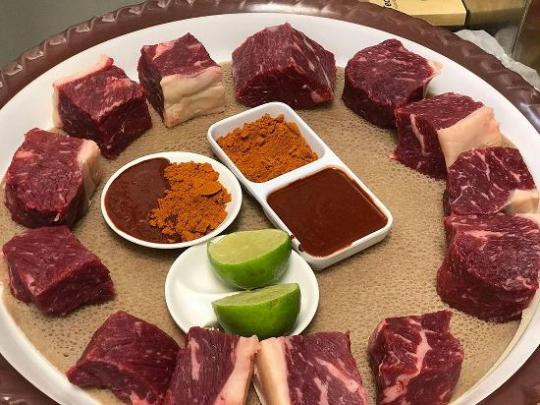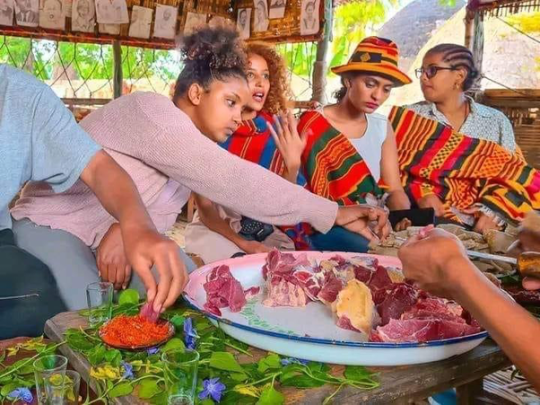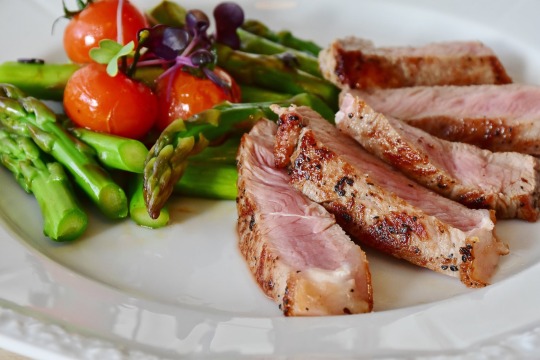#ethical food
Explore tagged Tumblr posts
Text
The Surucuá community in the state of Pará is the first to receive an Amazonian Creative Laboratory, a compact mobile biofactory designed to help kick-start the Amazon’s bioeconomy.
Instead of simply harvesting forest-grown crops, traditional communities in the Amazon Rainforest can use the biofactories to process, package and sell bean-to-bar chocolate and similar products at premium prices.
Having a livelihood coming directly from the forest encourages communities to stay there and protect it rather than engaging in harmful economic activities in the Amazon.
The project is in its early stages, but it demonstrates what the Amazon’s bioeconomy could look like: an economic engine that experts estimate could generate at least $8 billion per year.
In a tent in the Surucuá community in the Brazilian Amazonian state of Pará, Jhanne Franco teaches 15 local adults how to make chocolate from scratch using small-scale machines instead of grinding the cacao beans by hand. As a chocolatier from another Amazonian state, Rondônia, Franco isn’t just an expert in cocoa production, but proof that the bean-to-bar concept can work in the Amazon Rainforest.
“[Here] is where we develop students’ ideas,” she says, gesturing to the classroom set up in a clearing in the world’s greatest rainforest. “I’m not here to give them a prescription. I want to teach them why things happen in chocolate making, so they can create their own recipes,” Franco tells Mongabay.
The training program is part of a concept developed by the nonprofit Amazônia 4.0 Institute, designed to protect the Amazon Rainforest. It was conceived in 2017 when two Brazilian scientists, brothers Carlos and Ismael Nobre, started thinking of ways to prevent the Amazon from reaching its impending “tipping point,” when deforestation turns the rainforest into a dry savanna.
Their solution is to build a decentralized bioeconomy rather than seeing the Amazon as a commodity provider for industries elsewhere. Investments would be made in sustainable, forest-grown crops such as cacao, cupuaçu and açaí, rather than cattle and soy, for which vast swaths of the forest have already been cleared. The profits would stay within local communities.
A study by the World Resources Institute (WRI) and the New Climate Economy, published in June 2023, analyzed 13 primary products from the Amazon, including cacao and cupuaçu, and concluded that even this small sample of products could grow the bioeconomy’s GDP by at least $8 billion per year.
To add value to these forest-grown raw materials requires some industrialization, leading to the creation of the Amazonian Creative Laboratories (LCA). These are compact, mobile and sustainable biofactories that incorporate industrial automation and artificial intelligence into the chocolate production process, allowing traditional communities to not only harvest crops, but also process, package and sell the finished products at premium prices.
The logic is simple: without an attractive income, people may be forced to sell or use their land for cattle ranching, soy plantations, or mining. On the other hand, if they can make a living from the forest, they have an incentive to stay there and protect it, becoming the Amazon’s guardians.
“The idea is to translate this biological and cultural wealth into economic activity that’s not exploitative or harmful,” Ismael Nobre tells Mongabay."
-via Mongabay News, January 2, 2024
#amazon#amazon rainforest#rainforest#chocolate#sustainability#ethical food#brazil#natural resources#good news#hope
286 notes
·
View notes
Text
I think we as humans need to realize how privileged we are to be born into a human body.
Sure, I've seen a lot of people wishing how they could be a cat, dog or wolf just so they could be cute and taken care of and relax all day.
But let's remember that most non-human animals aren't so privileged.
Not only are pets often neglected and abused, but if you had been born into the body of a fish, a pig, a cow, a chicken?
Your life is seen as worthless - a means to an end. Fish are often not even regarded as living sentient beings, just decorations or food.
Pigs get their tails cut off, chickens get their beaks cut, often living in their own shit and piss. Cows get their babies stolen so you can drink their breast milk or eat cheese. And at the end of the day their lives are ended by being gassed, electrocuted, having their throat slit.
Thank your lucky stars for being born into the human body because your life could've been much much worse.
#vegan#veganism#meme#lol#animals#anti vegan#radical feminism#radblr#asexual#aromantic#feminism#feminist#anti capitalism#capitalism#chicken#pig#fish#cow#ethical food#foodporn#food photography#food#lgbtqia#lgbtq#queer community#queer#trans#us elections#election 2024#womens rights
76 notes
·
View notes
Text

Nicholaas Chiao, First Breakfast in Heaven, 2024, ink on paper
#art#contemporary art#nicholaas chiao#fine art#brooklyn artist#drawing#ethics#ethical food#longevity#immortality#futurism#conceptual art#postart#postmodern art
9 notes
·
View notes
Text



Ethiopia🇪🇹, Horn of Africa
A group Ethiopians having a raw meat lunch.
This popular dish among the Ethiopians is called "Tere siga".The meat mostly comes from the cow and served with a powdered hot spice blend called mitmita,a hot dipping sauce called "awaze", and senafich (mustard sauce).
A famous theory behind Ethiopians taste for raw meat comes from the Abyssinian-Adal war in 1600 It is believed that Ethiopians began to eat this food during the battles between Ethiopians and Somalians. It is believed that every time the Ehtiopian army prepared meat, the enemy easily fish them out and kill them in their sleep.They later came to the realization that the attàckers were using the fire that they mostly build to roast or cook the meat to locate them. To avoid being attacked in such a manner again, they chose to c0nsume their meats raw rather than roasting or c00king them.
This was later incorporated into Ethiopian culture and developed into a popular delicacy in honor of the occasion.

#african#afrakan#kemetic dreams#africans#brownskin#brown skin#afrakans#african culture#tera sigma#ethiopian#ethiopia#ethical food#ethical concerns#north east africa#east africa
20 notes
·
View notes
Text
Eat green, live clean: 10 ethical food practices to know
Ethical food practices help you eat responsibly and protect the planet.
If you care about the planet and what’s on your plate, ethical food practices should be on your radar. These are choices that respect the environment, animals, and the people who grow and produce our food. In a world where the food industry can be full of questionable practices, making informed decisions about what you eat has never been more important. So, here are 10 ethical food practices to…
0 notes
Text
Ethical Food
Ethical Food
My thing is that farm animals should be raised in an ethical and humaine way. They deserve to have a dignified life and dignified as pain free death as possible.
It's not as profitable and takes a lot more land and time. There is smaller farms and families that are able to do that.
However right now it's too expensive for the average family to afford those meats and foods.
It also comes around to the fact that low income families and people. Can not currently afford the products produced in these better ways.
0 notes
Text
Navigating the Ethical Terrain: Humans, Meat, and the Intricacies of Nature
In the ongoing discourse surrounding meat consumption, a pivotal argument emerges: the perceived cruelty associated with the act of eating animals. However, delving into the intricate fabric of the natural world prompts a reconsideration of this viewpoint. At the heart of this matter lies the undeniable reality that every organism, including humans, exists within a vast and interconnected…

View On WordPress
#Animal Welfare#balanced diet#Eco-Friendly Living#Environmental Impact#Ethical Eating#Ethical Food#Factory Farming#Historical Context#Holistic Choices#Interconnected Ecosystem#Meat Consumption#Natural Order#Omnivore Diet#Regenerative Farming#Sustainable Practices
0 notes
Text


Vegan brownie.
#recipe#brownies#veganfood#veganism#what vegans eat#vegan cake#go vegan#plantbased#handmade#homemade#ecofriendly#ethical food#food photography
0 notes
Text
Gods forbid you tell anyone about a pretty good deal on spices from an ethical company, lest you get called a “capitalist” lmao.
#its spices#from a store that ethically sources everything#and routinely donates to food shelters and soup kitchens#like there’s no ethical consumption under capitalism#but penzeys is pretty fucking close
1K notes
·
View notes
Text
For the purposes of this poll, assume the animals in question have been treated well, had adequate space and enrichment during their lives, and were killed humanely.
We ask your questions anonymously so you don’t have to! Submissions are open on the 1st and 15th of the month.
#polls#incognito polls#anonymous#tumblr polls#tumblr users#questions#polls about ethics#submitted feb 15#polls about food#polls about critters#ethics#morals#food#meat
423 notes
·
View notes
Text
Sustainable Eating: How to Make Ethical and Healthy Food Choices
Sustainable Eating: How to Make Ethical and Healthy Food Choices #sustainableeating #plantbaseddiet #localfood #ethicalfood #healthyeating
Sustainable eating is about making conscious and ethical choices when it comes to our food. It involves considering not only the impact our food choices have on our health, but also on the environment, animal welfare, and the communities that produce our food. Here are some tips for making sustainable food choices that are both healthy and ethical. Choose Locally Sourced Foods One of the…

View On WordPress
0 notes
Text
Spare Me Your Mercy Thoughts
I have waited almost four years for this show since MDL made a placeholder for Euthanasia in early-2021, and now that it is here, I'm going to gush about all the ways I love it!

Just like a few of Dr. Sammon's other shows airing around the holidays (Manner of Death, Dead Friend Forever, and Petrichor), I'm thankful I got the first episode of Spare Me Your Mercy on Thanksgiving and the last will come on Christmas because this is the exact show I need for the holiday season since it began the entire series with Tew, the cop, having to perform euthanasia on an animal.

I grew up and still live in a rural area where cattle far outnumber the actual folks, so I fully understand euthanasia is a good death as the word implies, so I will not be struggling through the premise of this show, and I have faith the show won't either because when Tew fired the gun, the scene was peaceful.

And the show is making some pointed remarks about how things operate outside of bigger cities since Kan specifically mentioned he has about 2,500 patients. When the other officer asked the nurses if Kan had a long queue, they didn't even respond. Kan also clarified that his specialty is palliative care, so he has to monitor a wide range of long-term illnesses, so even though Tew might actually be from this place, he is now the outsider and out of his depth before he even started.

Sidenote: I cannot be mad at a nurse, even if one of them turns out bad because the way they all protect Kan from the police is the teamwork I love to see.

The red light to notify the office the doctor is seeing a patient coming on right after Kan responded to the nurse that it wasn't a murder case yet was perfection.

I already knew Kan was going to be my favorite character, but Tor is doing amazing showing the layers Kan has, as expected. Kan tells Tor he can cry and shows him kindness, but when pushed, Kan makes small digs about how people should spend the last moments of someone's life cherishing them when rudely questioned by Tew regarding the unexpected deaths knowing Tew did not get to see his mother before she died. He also made a subtle display of knowing where things were located in the house because he is in control.

The way he slid his LINE information into the conversation AFTER indirectly telling Tew he was being emotional due to his grief is why I'm excited to see another version of Manner of Death's Tan. Kan probably does like Tew but he stays focused and calculated.

He is terrifying without there being any concrete detail to pinpoint on why he is scary. Som, while describing people being possessed by evil murderous spirits, was terrified of Kan, and the transition from Som telling his story to Kan appearing at the exact moment Som was going to state what human form the evil spirits take was brilliant.

But what's even more terrifying is the treatment of the terminally ill. They are viewed as a burden, locked away, and isolated.

And Tew witnessed it. He got a glimpse of what Kan sees daily, so the show is already building up a case in defense of Kan's actions. If he is performing euthanasia, Tew could understand. He heard the goat's bell. He knew it was still alive, but he decided to end its suffering, cleanly and swiftly, which is what euthanasia is. He saw that man left behind by his family and even moved to go get him. And he was bothered when the man's daughter stated her reasoning for leaving him out there alone.

He also stopped Kan from continuing to question Som. Therefore, the true conflict has been set. Tew, whose job is to discover the truth, doesn't need it if it causes pain, but Kan's entire job is making pain manageable.


And I always want to trust a woman, but as suspicious as the director is being about everything, babygirl would be the perfect person to attempt euthanasia since the dead would end up on her table where she could claim the death was the result of the illness.

Because euthanasia is a good death.

And this ain't it.

He understands that.

But someone doesn't.


#spare me your mercy#episode one#let me go make some food#and be thankful that Dr. Sammon continues to bless us with ethical dilemmas
133 notes
·
View notes
Text


Really proud of these vegan pork chops and thyme sauce with mashed potatoes 😊
0 notes
Text
trying not to start an online fight in a comically inappropriate venue, but people also have some genuinely concerning misconceptions about this, so: if someone tells you that they can't go vegan because of dietary restrictions, you do not know more than they do about those restrictions in question. and they are under no obligation to share personal medical details in order to prove that you are wrong.
moreover, a world in which anyone has to "prove" their need for dietary accommodations to any authority — to say nothing of being denied them a priori because of a refusal to engage with even small scale, ethical animal husbandry — is enacting ableist violence on our bodies. personally, I want nothing more than for for-profit animal agriculture to burn with the rest of capitalism — but you have to understand that telling people like me to "just stop being selfish and stop eating animals" can only be translated as either "only eat things that make you violently ill," or "stop eating even the minimum amount of protein that a human can survive off of."
if you have an impulse to accuse me of overreacting, consider that the refusal of actual medical institutions to take legume and grain allergies seriously has caused me bodily harm throughout my life and to this day — with consequences for my overall lifespan that have yet to be revealed. I am not overreacting.
#as always i feel the need to say that to the vegans who Aren't Like This (especially the disabled vegans)#i'm so fucking sorry for putting this on your dashes because i know you all deal with so much unwarranted shit#wholeheartedly i think veganism is one of the most amazing individual choices a person can make#it's just. the things that *certain people* will say to me about it.#ableism#allergyposting#i JUST made a dietary restriction positivity post where i expressed my sympathies to people dealing with this bullshit#and within 24 hours i was subjected to the bullshit myself. sad#this is why i can't just engage in discussions about food ethics#because a vocal minority of people just refuse to listen#or to envision a future that doesn't just replicate modern-day ableism and food injustice in an environmentally friendly guise
149 notes
·
View notes
Text

I wanted to highlight this because I knew it would come up as SOON as I mention common milkweed (asclepias syriaca), which is a milkweed from the Eastern and Central US.
Indigenous peoples, respected ethnobotanists, and veteran foragers eat milkweed by the bucket! If other people knew how amazing of a plant it is – there is something edible and delicious about it at every stage of growth, it is very easy to plant / spread its seeds, and it grows almost like a weed – they would love and cherish it.
If more people were encouraged to utilize it, they would be less likely to get rid of it in their yards. They might even start growing a whole patch. It’s a sustainable food source. We would be helping its insect friends who are HARMLESS to our gardens but important for the environment.
It’s not like, say, ramps that are overharvested every year and have disappeared from huge stretches of land where they were once abundant. Ramps grown from seed take SEVEN years to mature. Milkweed grows and matures the same year.
People eating milkweed don’t contribute to monarch butterfly decline. The use of herbicides, Big Agro, cities just mowing down whatever the hell they want are to blame.
That said, it’s still important to forage in an ethical way. Never strip a plant of all its flowers, leaves, or fruit. Never harvest an entire patch of plants from a single area. Check for beneficial insects and leave them alone. If a native plant has gone to seed, help spread those around.
This is NOT a callout — this is important information that I want everyone to know. Eating milkweed will NOT harm the monarch butterflies.
Learn More:
The Forager’s Harvest
Learn Your Land
Part 1 | Common Milkweed
#foraging#ethical foraging#sustainability#common milkweed#asclepias syriaca#us native plants#monarch butterfly#wild food#plant education
209 notes
·
View notes
Text

#max weber#protestant work ethic#catholic food ethic#the two cultures#potato europe and tomato europe
100 notes
·
View notes